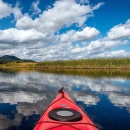Visit Us
Find the Refuge Bird Count Here
National wildlife refuges offer us all a chance to unplug from the stresses of daily life and reconnect with our natural surroundings. Visiting Mingo National Wildlife Refuge is an opportunity to see how much of southeast Missouri appeared before development, when 2.5 million acres were bottomland hardwood forest and cypress-tupelo swamp. This rich habitat supports many species of wildlife and provides us the chance to appreciate them in a variety of ways.
Location and Contact Information
About Us
Mingo National Wildlife Refuge consists of 21,592 acres of bottomland hardwood forest, cypress-tupelo swamp, marsh and upland forest ecosystems. The refuge is managed for wildlife habitat and people. The primary purpose of the refuge is to provide food and shelter for migratory waterfowl and to protect the bottomland hardwood forest.
What We Do
The National Wildlife Refuge System is a series of lands and waters owned and managed by the U.S. Fish and Wildlife Service. Wildlife conservation is at the heart of the refuge system. It drives everything we do from the purpose a refuge is established, to the recreational activities offered there, to the resource management tools we use. Selecting the right tools helps us ensure the survival of local plants and animals and helps fulfill the purpose of the refuge.
Our Organization
Our Species
The habitat at Mingo National Wildlife Refuge provides resources for a large variety of common and rare animals and has served as a site for supporting threatened and endangered species. A total of 279 resident and migratory bird species, 38 mammal species, 30 species of amphibian and reptiles and nearly 50 species of fish use the refuge throughout the year.




